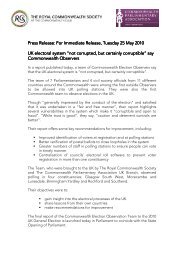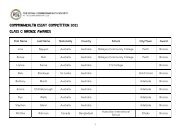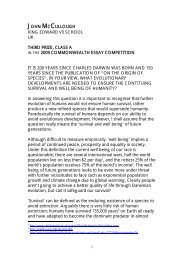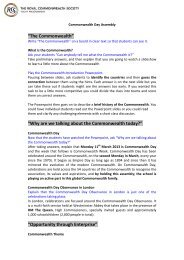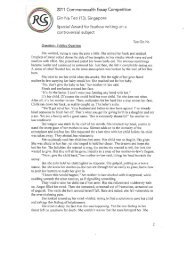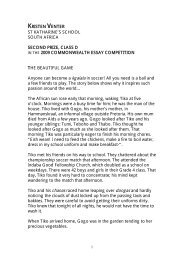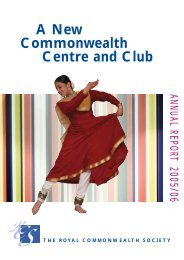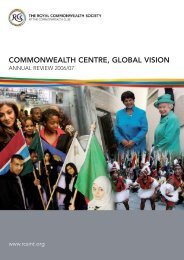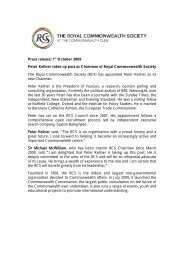Annual Review 2007-2008 - The Royal Commonwealth Society
Annual Review 2007-2008 - The Royal Commonwealth Society
Annual Review 2007-2008 - The Royal Commonwealth Society
Create successful ePaper yourself
Turn your PDF publications into a flip-book with our unique Google optimized e-Paper software.
like me, they were helpless. It never<br />
occurred to me that I would ever address<br />
such a dignified assembly about how<br />
deep-rooted gender issues are in my<br />
country, or how much good the gift of<br />
education can do.<br />
I did finally get married for all the right<br />
reasons, five years ago. But when I got<br />
married, I hoped and prayed fervently like<br />
my mother before me and countless<br />
other African women that I would not<br />
have a daughter. I know that the girl child<br />
is capable of achieving the same or more<br />
than her male counterpart. Yet when I<br />
looked around me, it broke my heart to<br />
think I might have a daughter who would<br />
go through the same struggles and face<br />
the same difficulties that I had. I thought<br />
wishing not to have a female child would<br />
nip everything at the bud. Two daughters<br />
later, I realised we couldn’t wish the girl<br />
child away! This struggle is not about me<br />
at all; it is much bigger than me. Nature<br />
operates in a continuum; the girl child is<br />
needed for the cycle of life to continue.<br />
We all have unique roles to play in<br />
enabling her to take her rightful place,<br />
just as nature intended.<br />
Dymphna’s letters and dreams for me<br />
made me push for further education; they<br />
have also instilled in me the desire to see<br />
how far I can follow my heart. Even<br />
though I had lost touch with her and the<br />
CCL, I never forgot her confidence in me.<br />
By sheer determination, I forged a career<br />
in banking; a terrain that, in my country, is<br />
very male dominated. I wanted a job that<br />
would pay enough to allow me to save<br />
money to set up an NGO (‘Teenmums’)<br />
that would address the plight of women<br />
forced into early marriages and<br />
motherhood without any education or<br />
skills.<br />
Coming to the UK for postgraduate<br />
studies has been a lifelong dream<br />
sparked by my gratitude to the CCL and<br />
the girls at Burntwood School where<br />
Dymphna was a governor. Jenny Groves,<br />
James Porter and Beatrice Kolade who I<br />
consider partners in the struggle for a<br />
better Africa for women, helped in no<br />
small measure.<br />
I want everyone here to know that<br />
there is no limit to what the African<br />
woman can achieve if given the right<br />
encouragement. <strong>The</strong>re is absolutely<br />
nothing special about me; my story could<br />
be the story of any other African woman<br />
who is given the same opportunity. I do<br />
not believe women in Africa want to be<br />
treated or viewed as being superior to<br />
men. Women do not want a different law<br />
to apply to them; they want to be<br />
recognised as partners in every struggle,<br />
as the equals they truly are. If legislation<br />
is made and enforced for free secondary<br />
education, worthy organisations like the<br />
CCL, the RCS and other charities would<br />
be freed to get on with the business of<br />
providing women with further education<br />
which would better equip them for nation<br />
building.<br />
I read a story once about an English<br />
missionary who went to Africa. <strong>The</strong><br />
Ladi Dariya, a former recipient<br />
of the <strong>Commonwealth</strong><br />
Countries League scholarship,<br />
addresses the RCS on how<br />
women’s rights might be<br />
improved through gender<br />
education in October <strong>2007</strong><br />
missionary told the story of heading to a<br />
neighbouring village from the one where<br />
the church was stationed. <strong>The</strong>re was a<br />
stream to be crossed between these two<br />
villages. He said he saw an African<br />
gentleman and his wife coming from the<br />
farm. <strong>The</strong> wife had on her head the farm<br />
produce they had harvested in a basket.<br />
On top of that was her husband’s hoe as<br />
well as hers. This woman was also heavily<br />
pregnant and had a toddler in a sling at<br />
her side. Her husband was walking in<br />
front with manly strides carrying nothing<br />
while she struggled under these heavy<br />
burdens, trying to keep up. When they<br />
got to the stream, the husband stopped<br />
to wait for her. <strong>The</strong> missionary thought to<br />
himself “surely he will have to carry some<br />
of these burdens now”. But to his utter<br />
horror, the man climbed his wife’s back,<br />
making sure his feet did not get wet,<br />
while she walked uncertainly across the<br />
stream. Now, whether this actually<br />
happened or is a fable is not the issue.<br />
This story epitomises the strength of the<br />
African woman. Education can only make<br />
her stronger and the continent will be the<br />
better for it.<br />
This is an edited version of a speech by<br />
Ladi Dariya to the <strong>Royal</strong> <strong>Commonwealth</strong><br />
<strong>Society</strong>, on 10 October <strong>2007</strong>.<br />
Ladi Dariya is an MA candidate in<br />
Management at Robert Gordon<br />
University, and a former <strong>Commonwealth</strong><br />
Countries League Education Fund scholar.<br />
www.rcsint.org<br />
41



